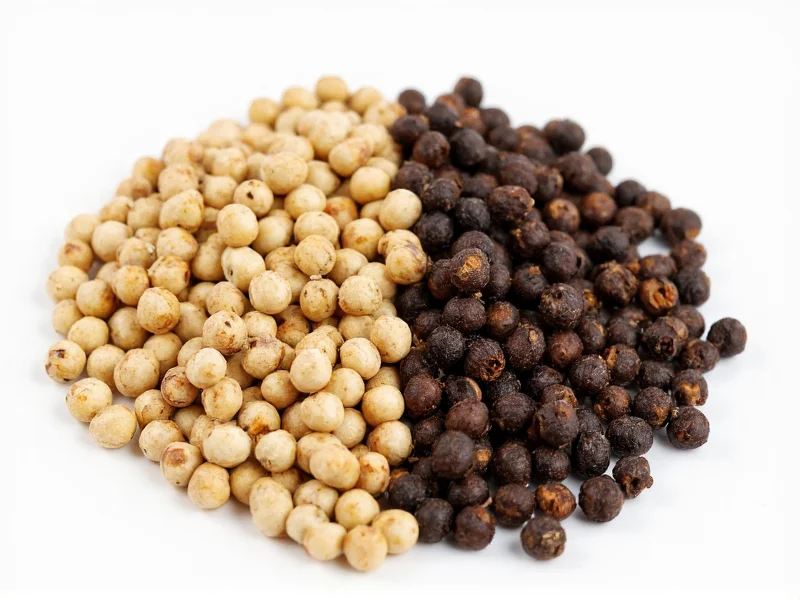Black pepper IS made from peppercorns. Peppercorns are the unripe fruit of the Piper nigrum plant, and black pepper is created when these peppercorns are dried. The confusion arises because 'peppercorn' refers to the whole berry before grinding, while 'black pepper' describes both the dried berry and the ground spice. They're not different products but different stages of the same spice.
Understanding the difference between black pepper and peppercorn clears up a common culinary misconception. Many home cooks and even professional chefs use these terms interchangeably without realizing they describe the same fundamental ingredient at different processing stages. This confusion often leads to recipe misunderstandings and unnecessary grocery store dilemmas.
Peppercorns: The Botanical Beginning
Peppercorns originate from the Piper nigrum vine, a flowering plant native to South India. What we call "peppercorns" are actually the plant's fruit—small, green drupes that grow in clusters. These unripe berries contain piperine, the compound responsible for pepper's characteristic heat and pungency.
When harvested green and unripe, then dried, these berries become what we know as black peppercorns. The drying process causes enzymatic reactions that darken the outer layer (pericarp), creating the familiar black appearance. This explains why black pepper comes from peppercorns—they're intrinsically connected.
Processing Methods Create Different Pepper Varieties
The same Piper nigrum fruit produces various pepper types based on harvest timing and processing:
| Pepper Type | Harvest Stage | Processing Method | Flavor Profile |
|---|---|---|---|
| Black Peppercorn | Unripe (green) | Sun-dried with outer layer intact | Sharp, pungent, complex with floral notes |
| White Peppercorn | Ripe (red) | Soaked to remove outer layer, then dried | Milder, earthier, less complex |
| Green Peppercorn | Unripe (green) | Preserved in brine or freeze-dried | Fresher, fruitier, less pungent |
| Red Peppercorn | Fully ripe (red) | Dried with outer layer intact | Sweeter, fruitier, milder heat |
Why the Terminology Confusion Persists
The peppercorn vs black pepper explained dilemma stems from inconsistent language usage. In culinary contexts:
- "Peppercorn" typically refers to the whole, dried berry before grinding
- "Black pepper" describes both the dried berry and the ground spice
- Grocery stores often label whole berries as "peppercorns" and ground product as "black pepper"
This labeling convention reinforces the mistaken belief that they're different products. When a recipe calls for "cracked peppercorns," it simply means coarsely ground black pepper. Understanding this are black pepper and peppercorn the same thing question prevents unnecessary substitutions.
Culinary Applications and Flavor Differences
While black pepper and peppercorns originate from the same source, their form affects culinary use:
Whole peppercorns (often mislabeled as just "peppercorns") provide:
- Longer shelf life (up to 3 years when stored properly)
- More complex flavor release when cracked fresh
- Ideal for marinades, pickling, and slow-cooked dishes
Ground black pepper offers:
- Immediate flavor dispersion
- Convenience for quick seasoning
- Shorter shelf life (loses potency after 6 months)
The are peppercorns just black pepper question has a nuanced answer: yes, but the whole form preserves flavor compounds better. Freshly cracked pepper contains higher piperine levels, delivering more heat and complexity than pre-ground versions.
Storage Recommendations for Maximum Freshness
To maintain optimal flavor whether you're using whole peppercorns or ground black pepper:
- Store in airtight containers away from light and heat
- Keep whole peppercorns in dark glass or opaque containers
- Grind only what you'll use within 1-2 weeks for best flavor
- Avoid storing near stovetops or ovens where temperature fluctuates
Whole peppercorns retain their volatile oils significantly longer than ground pepper. This explains why professional kitchens always use peppermills rather than pre-ground containers—the difference in flavor intensity is substantial.
Common Misconceptions Debunked
Several myths persist about the difference between black pepper and peppercorn:
Myth: "Peppercorns are a different plant species than black pepper."
Fact: Both come exclusively from Piper nigrum. Other "peppers" (like chili peppers) belong to completely different plant families.
Myth: "White pepper comes from a different plant than black pepper."
Fact: White pepper uses the same peppercorns, but processors remove the outer layer after full ripening.
Myth: "Pink peppercorns are related to black pepper."
Fact: Pink peppercorns come from a completely different plant (Schinus molle) and aren't true pepper.
Nutritional Profile Comparison
Both whole peppercorns and ground black pepper share identical nutritional properties per equivalent serving:
- Rich in piperine (enhances nutrient absorption)
- Contains manganese, vitamin K, and iron
- Antioxidant and anti-inflammatory properties
- Same caloric content (about 25 calories per tablespoon)
The primary nutritional difference comes from freshness—whole peppercorns retain more volatile compounds until grinding. This makes freshly cracked pepper potentially more beneficial for health applications, particularly regarding piperine's ability to increase curcumin absorption by up to 2000%.











 浙公网安备
33010002000092号
浙公网安备
33010002000092号 浙B2-20120091-4
浙B2-20120091-4